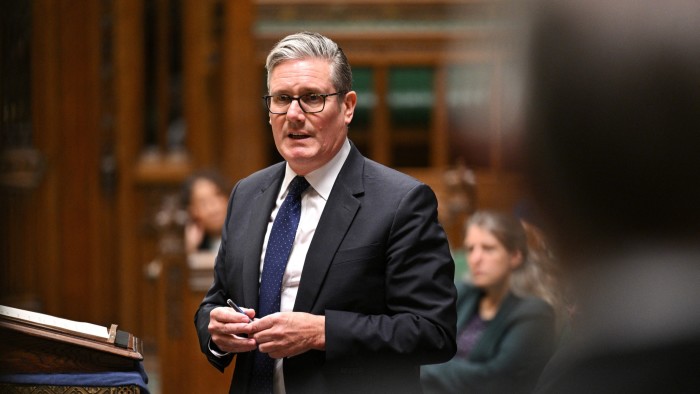This article is an on-site version of our Inside Politics newsletter. Subscribers can sign up here to get the newsletter delivered every weekday. If you’re not a subscriber, you can still receive the newsletter free for 30 days
Good morning. Keir Starmer has decided that discretion is the better part of valour, making expensive concessions to Labour rebels over the government’s planned cuts to welfare. Some thoughts on what it means in today’s note.
Inside Politics is edited by Georgina Quach. Follow Stephen on Bluesky and X, and Georgina on Bluesky. Read the previous edition of the newsletter here. Please send gossip, thoughts and feedback to insidepolitics@ft.com
Defusing a civil war
Will the extensive concessions being put forward by the government be enough to see off defeat in the Commons next week? My sense from talking to MPs is “almost certainly”.
Some of the rebels are a) so bruised by the government’s tactics to win this vote, b) so distrustful of what the government has said to win this vote, and c) have specific policy objections that they are not convinced are covered, and/or d) rather enjoying being able to rub what they see as a high-handed Downing Street’s nose in the mud, that they can’t take “Yes” for an answer.
But there are enough MPs who will see these concessions as a victory. That will mean that when the votes are being cast, most of the rebels will decide that they are better off taking the win than risking being part of a doomed last stand.
In terms of the policy merits of the changes, I am aware that I am running long this morning, so I will return to that in a future newsletter.
For now, the big picture point I will make is that the trajectory and nature of this government has been permanently changed. It further confirms what the retreat on winter fuel payments showed us: when push comes to shove, this government will not be able to grit out and defend cuts in public spending.
It could not do it on winter fuel payments, when there was a strong case to be made in defence of the policy on the merits and when the people who lost out were largely concentrated among non-Labour voters. It could not do it on cuts to personal independence payments, when it did not have a strong case to defend the policy on the merits and those worst hit by it do vote Labour. How about those very tight spending settlements as envisaged for some departments in the comprehensive spending review? Not a chance of them being delivered in my view.
It is also a defeat for the “MPs need to get in line” manner that many at the heart of the government thought they could make their default approach to managing the Parliamentary Labour party. Labour will have to find new ways of operating in both policy and parliamentary terms. This is a significant moment not only for the government on welfare policy but also on how Starmer’s administration handles the next four years.
My colleagues Robert Shrimsley, Miranda Green and I will be answering your questions on this very topic next Thursday in a live Q&A on the FT site. You can leave your questions/thoughts in the comments under this article anytime from now and we’ll hop on at 1pm, July 3, to respond. Any that we don’t get round to may be tackled in future newsletters.
Now try this
Here’s a good lunch recommendation: the Greenberry Cafe, which is in walking distance of Regent’s Park, where I had an absolutely lovely lunch recently.
However you spend it, have a wonderful weekend.
Top stories today
-
Over the Hillier | Meg Hillier, who pushed for changes to the bill, had warm words to say this morning in response to the concessions: “This is a good and workable compromise and shows that the Labour government has listened.” But some rebels told the FT they are still uncertain. Rachael Maskell, MP for York Central, said the bill “cannot and must not be saved”. Here’s the inside track on how it all unfolded.
-
Not warm words | More UK businesses are responding to Labour’s increase in national insurance contributions by cutting hiring, working hours and pay, the Bank of England governor has said, warning of a weakening jobs market.
-
Time to let go? | Associated British Foods has raised the stakes in its stand-off with the UK government over the future of the country’s largest bioethanol plant, as a new trade pact with the US threatens to flood the market with tariff-free ethanol.
-
Intervening before tragedy strikes | If a teenager falls victim to a homicide in the UK, it’s overwhelmingly likely — 83 per cent — that they have been stabbed. What is being done to try to stop first-time offenders caught with blades from spiralling into murderers? The Standard’s Tristan Kirk takes a close look at London’s youth courts and the hard work by magistrates, lawyers and other professionals in steering children away from crime.





